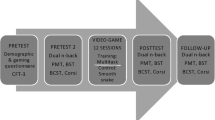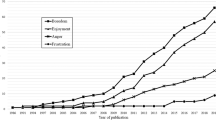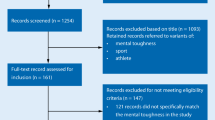Abstract
The aim of this study was to interpret university students’ affective experiences while taking part in two practical sessions based on cooperative and psychomotor games with and without competition. Six students of physical education and sport took part in the study. The validated Games and Emotions Scale (GES) questionnaire was used, which was completed at the beginning and at the end of each session. Two individual interviews were then conducted with each participant (one per session). The data were analyzed using ATLAS.ti v.62 software. We would highlight the following findings: a) both types of games trigger individual and group affective wellbeing in the participants; b) individual wellbeing is conditioned by aspects of the games’ internal logic (motor relationships, and the presence or absence of competition) whereas group wellbeing is triggered mainly by aspects external to the group (social relationships between the participants, and sports background or personal perceptions).





Similar content being viewed by others
References
Alonso, J. I., Gea, G., & Yuste, J. L. (2013). Formación emocional y juego en futuros docentes de Educación física. [Emotional training and game in future physical education teachers]. Revista Electrónica Interuniversitaria de Formación del Profesorado, 16(1), 97–108.
Ames, C. (1984). Competitive, cooperative, and individualistic goal structures: A cognitive-motivational analysis. Research on motivation in education, 1, 177–207.
Andrade, E., Arce, C., Garrido, J., Torrado, J., & De Francisco, C. (2014). Modelo de medida del estado de ánimo subjetivo en deportistas adolescentes. [Measurement model of subjective mood states in adolescent athletes] Revista de Psicología del Deporte, 20(2).
Beltrán, V., Devís, J., Peiró, C., & Brown, D. H. (2012). When physical activity participation promotes inactivity negative experiences of Spanish adolescents in physical education and sport. Youth Society, 44(1), 3–27.
Bisquerra, R. (2000). Educación emocional y bienestar. [Emotional education and wellbeing] Barcelona: Praxis.
Bisquerra, R. (2003). Educación emocional y competencias básicas para la vida. [Emotional education and basic competencies for life]. Revista de Investigación Educativa, 21(1), 7–43.
Bisquerra, R., & Pérez, N. (2007). Las competencias emocionales. [Emotional competences] Educación XX1, (10), 61–82.
Boletín oficial del estado 25/2015, de 29 de enero. (2015) [Official State Gazette of the Government of Spain 25/2015, of 29 January] [online]. online https://www.boe.es/boe/dias/2015/01/29/. Consultado: 11 de junio de 2017.
Brotheridge, C. M., & Grandey, A. A. (2002). Emotional intelligence and burnout: Comparing to perspectives of ‘people work’. Journal of Vocational Behavior, 60, 17–39.
CASEL (Collaborative for Academic, Social, And emotional learning). (2006) SEL Competences [en línia] (UIC) University of Illinois at Chicago: Chicago.
Cohen, L., & Manion, L. (1990). Método de investigación educativa (No. 37.012). [Research methods in education] La Muralla.
Cury, F., Biddle, S., Famose, J. P., Goudas, M., Sarrazin, P., & Durand, M. (1996). Personal and situational factors influencing intrinsic interest of adolescent girls in school physical education: A structural equation modelling analysis. Educacional Psychology, 16(3), 305–315. https://doi.org/10.1080/0144-3410/96/03/0305-11.
Delors, J. (1996). de la publicación: La Educación Encierra un Tesoro. Santillana. UNESCO. Cap, 4, 91–103.
Duran, C., Lavega, P., Salas, C., Tamarit, M., & Invernó, J. (2015). Educación Física emocional en adolescentes. Identificación de variables predictivas de la vivencia emocional. [Emotional physical education in adolescents. Identifying predictors of emotional experience] CCD. Cultura, Ciencia, Deporte, 10(28), 5–18.
Elias, N. (1987). On human beings and their emotions: A process-sociological essay. Theory, Culture and Society, 4(2), 339–361.
Etxebeste, J., del Barrio, S., Urdangarín, C., Usabiaga, O., & Oiarbide, A. (2014). Ganar, perder o no competir: la construcción temporal de las emociones en los juegos deportivos. [Win, lose or not compete: the temporary construction of emotions in sports games]. Educatio Siglo XXI, 32(2), 49–70.
Graham, G. (1995). Physical education through students’ eyes and in students’ voice implications for teachers and researchers. Journal of Teaching in Physical Education, 14, 478–482.
Greenberg, M. T., Weissberg, R. P., O'Brien, M. U., Zins, J., Fredericks, L., Resnik, H., & Elias, M. J. (2003). Enhancing school-based prevention and youth development through coordinated social, emotional, and academic learning. The American Psychologist, 58, 466–474.
Harvey, S., & O’Donovan, T. M. (2011). Pre-service physical education teachers’ beliefs about competition in physical education. Sport, Education and Society, 18(6), 767–787. https://doi.org/10.1080/13573322.2011.610784.
Jones, G., Hanton, S., & Swain, A. (1992). Intensity and direction as dimensions of competitive state anxiety and relationships with competitiveness. Perceptual and Motor Skills, 74, 467–472. https://doi.org/10.2466/PMS.74.2.467-472.
Kemper, T. D. (1978). A social interactional theory of emotions (p. 933). New York: Wiley.
Kemper, T. D. (1981). Social constructionist and positivist approaches to the sociology of emotions. The American Journal of Sociology, 87(2), 336–362.
Kemper, T. D. (1991). Predicting emotions from social relations. Social Psychology Quarterly, 54, 330–342.
Lagardera, F., & Lavega, P. (2004). La ciencia de la acción motriz. [Science of motor action] Lleida: Edicions de la Universitat de Lleida.
Lavega, P. (2009). La investigación en los juegos tradicionales y en los juegos cooperativos [Research on traditional games and cooperative games], en Navarro, V. & Trigueros, C. (ed). Investigación y juego motor en España (pp. 77–116). Lleida: Universitat de Lleida.
Lavega, P., March, J., & Filella, G. (2013). Juegos deportivos y emociones. Propiedades psicométricas de la escala GES para ser aplicada en la educación física y el deporte. [Sports games and emotions. Psychometric properties of the games and emotions scale (GES) and its use in physical education]. Revista de Investigación Educativa, 31(1), 151–166.
Lavega, P., Alonso, J. I., Etxebeste, J., Lagardera, F., & March, J. (2014a). Relationship between traditional games and the intensity of emotions experienced by participants. Research Quarterly for Exercise and Sport, 85(4), 457–467.
Lavega, P., Lagardera, F., March, J., Rovira, G., & Coelho, P. (2014b). Efecto de la cooperación motriz en la vivencia emocional positiva: perspectiva de género. [Effect of motor cooperation on positive emotional experiences: a gender perspective]. Movimento, 20(2), 593–618.
Lavega, P., Planas, A., & Ruiz, P. (2014c). Juegos cooperativos e inclusión en educación física. [Cooperative games and inclusion in physical education] Revista Internacional de Medicina y Ciencias de la Actividad Física y del Deporte, (53).
Lawler, E. J., & Thye, S. R. (1999). Bringing emotions into social exchange theory. Annual Review of Sociology, 25(1), 217–244.
Lazarus, R. S. (1991). Emotion and adaptation. New York: Oxford University Press.
Lazarus, R. S. (2000). How emotions influence performance in competitive sports. The Sport Psychologist, 14, 229–252.
LOMCE. (2014). Real Decreto 1105/2014, de 26 de diciembre, por el que se establece el currículo básico de la educación secundaria obligatoria y del bachillerato. [Royal Decree 1105/2014, of 26 December, establishing the basic curriculum for compulsory secondary education and for further education], Pub. L. No. 3, I. Disposiciones generales, BOE-A-2015-37 169. Recuperado a partir de https://www.boe.es/diario_boe/txt.php?id=BOE-A-2015-37.
López-Gonzalez, L., & Bisquerra, R. (2013). Validación y análisis de una escala breve para evaluar el clima de clase en educación secundaria. [Validation and analysis of a brief scale to assess classroom climate in secondary education]. Isep Science, 5, 62–77.
Lundqvist, C. (2011). Well-being in competitive sports - the feel-good factor? A review of conceptual considerations of well-being. International Review of Sport and Exercise Psychology, 4(2), 109–127.
Martínez, M. (2006). Ciencia y arte en la metodología cualitativa. [Science and art in qualitative methodology].
Miles, M. B., & Huberman, A. M. (1994). Qualitative data analysis (2nd ed.). Thousand Oaks: Sage.
Muñoz, V., Lavega, P., Serna, J., Sáez de Ocáriz, U., & March, J. (2017). Estados de ánimo al jugar en solitario o en cooperación: dos vivencias motrices y afectivas desiguales.[mood states when playing alone or in cooperation: Two unequal motor and affective experiences]. Anales de psicología, 33(1), 196–203.
Palomera, R., Fernández-Berrocal, P., & Brackett, M. A. (2008). La inteligencia emocional como una competencia básica en la formación inicial de los docentes: algunas evidencias. [Emotional intelligence as a basic competency in initial teacher training some evidence]. Electronic Journal of Research in Educational Psychology, 6(15), 437–454.
Parlebas, P. (2001). Juegos, deporte y sociedad. Léxico de praxiología motriz. [Games, sports and societies: lexicon of motor praxeology] Barcelona: Paidotribo.
Payton, J. W., Wardlaw, D. M., Graczyk, P. A., Bloodworth, M. A., Tompsett, C. J., & Weissberg, R. P. (2000). Social and emotional learning: A framework for promoting mental health and reducing risk behaviors in children and youth (download). The Journal of School Health, 70, 179–185.
Pyhältö, K., Pietarinen, J., & Salmela-Aro, K. (2011). Teacher-working-environment fit as a framework for burnout experienced by Finnish teachers. Teaching and Teacher Education, 27, 1101–1110.
Riba, C.E. (2007). La metodologia qualitativa en l'estudi del comportament [Qualitative methodology in the study of behavior] (Vol. 117). Editorial UOC.
Scheer, M. (2012). Are emotions a kind of practice (and is that what makes them have a history)? A bourdieuian approach to understanding emotion. History and theory, 51(2), 193–220. https://doi.org/10.1111/j.1468-2303.2012.00621.x.
Taylor, S. J., & Bogdan, R. (1987). Introducción a los métodos cualitativos de investigación [introduction to qualitative research methods] (Vol. 1). Barcelona: Paidós.
Thoman, D. B., Sansone, C., & Pasupathi, M. (2007). Talking about interest: Exploring the role of social interaction for regulating motivation and the interest experience. Journal of Happiness Studies, 8, 335–370. https://doi.org/10.1007/s10902-006-9016-3.
Acknowledgements
This study was funded by the Spanish Ministry of Science and Innovation through RD&I projects DEP2010-21626-C03-01, DEP2010-21626-C03-02 and DEP2010-21626-C03-03, and by the National Institute of Physical Education of Catalonia [INEFC-Lleida] through project PARINEFC2016_005.
Author information
Authors and Affiliations
Corresponding author
Ethics declarations
Conflict of Interest
On behalf of all authors, the corresponding author states that there is no conflict of interest.
Rights and permissions
About this article
Cite this article
Muñoz-Arroyave, V., Lavega-Burgués, P., Costes Rodríguez, A. et al. University students’ affective experiences while playing: A qualitative perspective. Curr Psychol 40, 1133–1143 (2021). https://doi.org/10.1007/s12144-018-0028-z
Published:
Issue Date:
DOI: https://doi.org/10.1007/s12144-018-0028-z




